Iran Nuclear Chief Says Will Curb Program If Sanctions Lifted
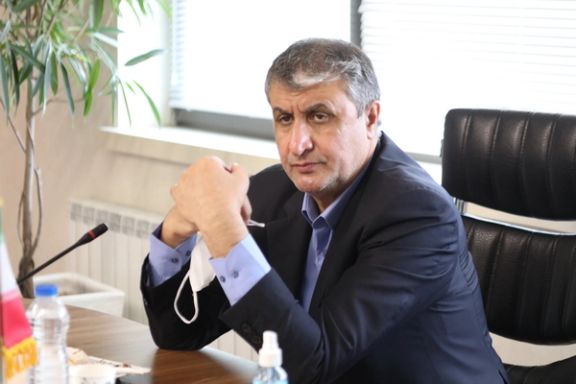
The head of the Atomic Energy Organization of Iran (AEOI) says the country’s nuclear industry is controlled from Tehran, not Vienna.

The head of the Atomic Energy Organization of Iran (AEOI) says the country’s nuclear industry is controlled from Tehran, not Vienna.
Mohammad Eslami speaking to a group of reporters in Tehran on Thursday stressed that Iran’s emphasis in the Vienna talks was on seeing sanctions removed. He added that Iran would meet its obligations under the 2015 agreement, the JCPOA (Joint Comprehensive Plan of Action), as sanctions were lifted in a verifiable manner and the necessary guarantees given by world powers. Eslami
Eslami said last week Iran was ready to clear up by June 20 outstanding questions raised by the International Atomic Energy Agency (IAEA) over Tehran’s nuclear work before 2003. While this is a requirement under Iran’s safeguards arrangements under the Nuclear Non-Proliferation treaty and not linked to JCPOA restoration, there has been speculation that the issue was muddying the Vienna talks.
In his report to the IAEA board meeting Monday, IAEA chief Rafael Mariano Grossi highlighted that “making progress on the clarification of the outstanding safeguards issues” with Iran remained an agency priority.
In Vienna Wednesday, the US Deputy Chief of Mission to the IAEA Louis Bono expressed “significant concerns” over Iran’s responsibility for transparency under the Nuclear Non-Proliferation ‘safeguards’ rules, noting that Iran needed to answer agency questions over its nuclear work before 2003 as “a legal obligation separate from its JCPOA commitments.”
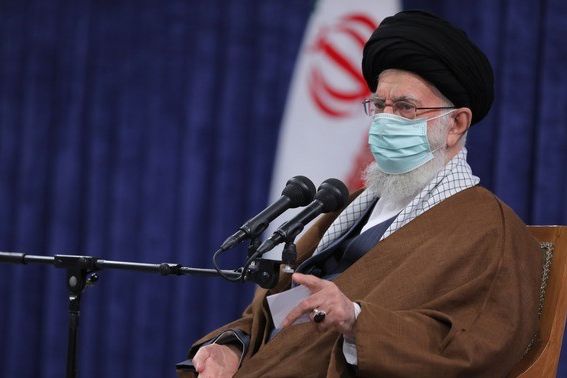
Iran's Supreme Leader on Thursday appeared to be upping the ante in the talks to restore the 2015 nuclear deal after a period of relative silence on the issue.
"It's a big error to bow to the pressure from America or other powers to secure protection against sanctions, which will deal a blow to the nation's political power," Supreme Leader Ali Khamenei said in an address to members of the Assembly of Experts.
"Our regional power provides us with strategic depth and more national strength, why should we give it up? Advancement in nuclear science will help us meet the country's needs in the future, who can we turn to a few years later if we give it up now?" he said, adding that there was nothing more "naive and inexpertly" than suggestions to reduce the country's defensive (military) power to "avoid raising the enemy's sensitivity".
"Over time [many] such feeble and faulty suggestions have been made, all of which were revocable, and they were revoked. Iran would be facing great dangers if those who wanted to sever some of the arms of national power were allowed to do so," he said in a rather uncompromising tone.
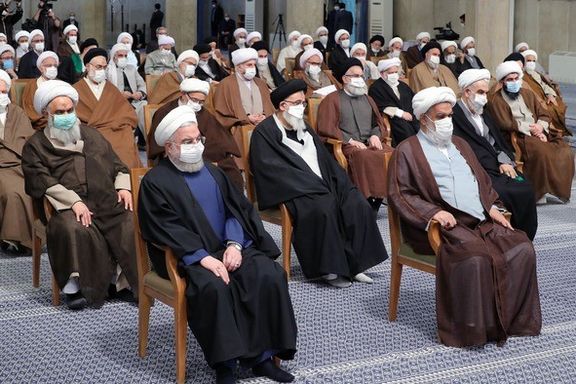
In his speech Khamenei cited “security and defense power", the "power of politicking and bargaining to fulfill national interests at the regional and global front”, and securing a strong economy and public’s wellbeing among the "pillars of national power". “None of these arms of national power should be cut off in favor of one pillar and the other,” Khamenei said.
Iran has been enriching uranium to 60-percent purity since early 2021 shortening the time it would need to reach 90-percent needed for a nuclear bomb. It first started to enrich to 20-peercent purity in 2019 when the United States strengthened oil sanctions imposed a year earlier when former president Donald Trump withdrew from the Joint Comprehensive Plan of Action (JCPOA). The higher-level enrichment violates the nuclear agreement.
Officials say sanction have affected people's livelihoods but insist the government is finding ways to minimize their impact and the country can endure. In his speech Khamenei made no mention of how he intends to ensure "public welfare and easy livelihood" if sanctions were not lifted.
Iran has also continued expanding its ballistic missile and other weapons programs, resisiting any Western attempts to discuss limitations.
A key website, Nour News, on Thursday insisted that a nuclear deal would not stop Iran's missile program and praised Tehran’s negotiators in the Vienna nuclear talks for having thwarted US attempts to force Iran to discuss its missile program. On Saturday the Revolutionary Guards (IRGC) unveiled two underground missile bases and on Tuesday put a second military satellite into orbit.
Earlier on Thursday, secretary of the Supreme National Security Council (SNSC), Ali Shamkhani said nuclear talks "get knottier by the hour" and accused the US of not being interested in a "strong deal".
Officials involved in the talks in Vienna last week, including the Russian envoy to the talks, appeared very optimistic about reaching a deal even as early as this week. Uncertainties arose on Saturday when Russian Foreign Minister Sergei Lavrov said Moscow wanted written guarantees from the US that its nuclear and economic relations with Tehran would not be affected by sanctions over Russia's invasion of Ukraine.
Despite the new complication Tehran and Moscow argue that major and secondary issues have remained unresolved, which the Western side should address before a final text can be agreed on and hold the US responsible for the delay in signing the deal.
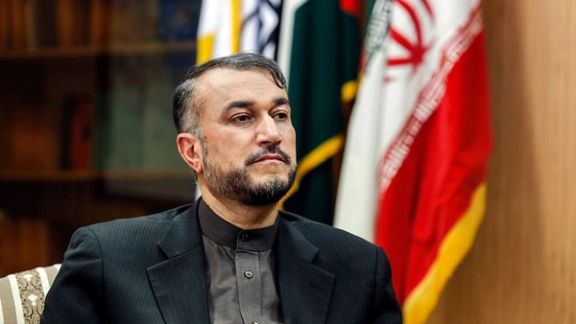
New demands by the US in talks to revive the 2015 nuclear deal are unjustified, Iran’s Foreign Minister Hossein Amir-Abdollahian told EU’s foreign policy chief.
The foreign minister did not explain what Washington’s new demands were, but he made an indirect reference to Tehran’s insistence on lifting US sanctions imposed on the Revolutionary Guard (IRGC) and several high-ranking officials.
Amir-Abdollahian told EU’s Jodep Borrell that “Some issues are related to our national heroes and cannot be discussed,” according to Fars news in Tehran affiliated with the IRGC.
Reports emerged last week that the Biden Administration has agreed to lift sanctions imposed on IRGC and several former and current Iranian officials implicated in terror-related activities.
The news led to protests by Republicans and others in the United States. Several lawmakers wrote to President Joe Biden asking him to stop talks aimed at reviving the Obama-era nuclear deal known as JCPOA.
Amir-Abdollahian told Borrell, according to Fars, that Tehran cannot accept US requests based on American domestic opposition to certain points discussed in the nuclear talks.
“America cannot use the excuse of public opinion to say something new every day…If America has a public opinion problem…we also have,” the minister said.
Russia on Saturday introduced new demands asking exemption from Ukraine sanctions in its dealings with Iran, adding a new complicating factor in the Vienna talks. Iran has not opposed Russia’s demands, insisting that the US is delaying an agreement.
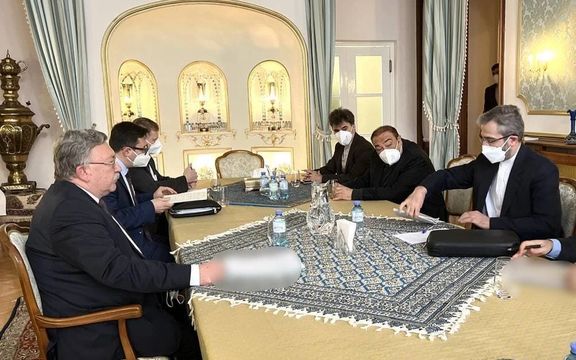
Iran’s top national security official Ali Shamkhani says that nuclear talks with world powers "get knottier by the hour", as Russia has introduced new demands.
Russia has demanded US guarantees that sanctions over Ukraine would not affect its trade and wider relations with Tehran, before it agrees with a nuclear deal negotiated in Vienna for over 11 months.
Iran has not opposed the last-minute Russian demands. Instead, both Moscow and Tehran blame the US for "lacking political resolve" to reach a deal to restore the Joint Comprehensive Plan of Action (JCPOA), and the US does not appear to be willing to accept the Russian demands.
Moscow denies that it is holding the JCPOA hostage to its own interests as many in Iran claim and insists on having free trade with Iran despite sanctions imposed on Moscow over its invasion of Ukraine.
Secretary of Iran’s Supreme National Security Council (SNSC) Ali Shamkhani in a tweet Thursday said the talks "get knottier by the hour" and accused the US of not being interested in a "strong deal" but made no reference to Moscow's new demands.
“US approach to Iran's principled demands, coupled with its unreasonable offers and unjustified pressure to hastily reach an agreement, show that US isn't interested in a strong deal that would satisfy both parties. Absent US political decision, the talks get knottier by the hour,” Shamkhani said in his tweet.
On Thursday Tasnim News Agency which is linked to the Revolutionary Guards quoted "an informed source" as saying that "at least 3 or 4 major and secondary issues" remain unresolved in the talks in Vienna that the Western side should address.
The source accused the US of "psychological and media operations" to project the blame on others instead of "real negotiation." This could refer to briefings from US and western European officials in response to Lavrov's demand.
According to the Wall Street Journal correspondent Laurence Norman Moscow officially presented its new demand in the form of an updated "non-paper" to the to the EU on Tuesday. The Russian envoy in the talks, Mikhail Ulyanov, has admitted that Moscow's demands, apparently outlined in the "non-paper", have not been received well by the other parties.
"There’s nothing that should be required of or will be offered from the United States as it relates to Russia sanctions — that is related to their invasion of Ukraine," White House Spokeswoman Jan Psaki on Wednesday evening when asked about reports that Russia is delaying the signing of the JCPOA for its own interests.
Ulyanov told reporters last week that the talks were approaching the finishing line and even suggested it could be signed as early as the past weekend or Monday this week, but on Wednesday he said that there was still "no final text" of an agreement so the Russian position could not be blamed for a delay in reaching an agreement over the restoration of the JCPOA.
"In view of the new circumstances and wave of sanctions against Russia we have the right to protect our interests in the nuclear field and wider context," Ulyanov said on Wednesday and explained that the United States and European Union must make it clear that sanctions must not affect the implementation of Moscow's nuclear projects in Iran or its trade and economic relations with Tehran neither at present nor in the future.
Two Western diplomats told Reuters on Wednesday that it was still not clear what the exact nature of Moscow's demands were, while a European diplomat said Russia was demanding sweeping guarantees on trade between Moscow and Tehran, demands that were deemed unacceptable.
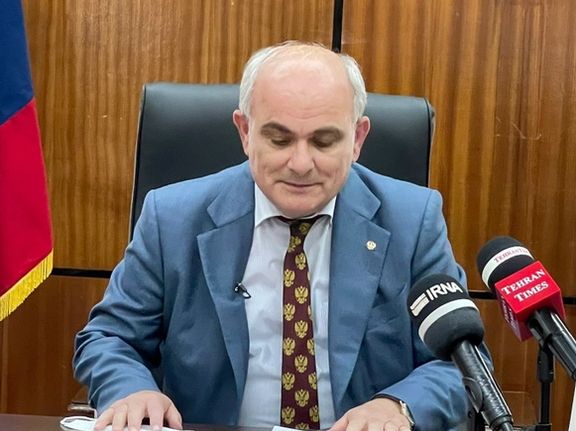
Russia’s envoy in Tehran Wednesday tried to smooth out negative reactions to Moscow’s demands tying Western sanctions over Ukraine to the Iran nuclear talks.
"We want the JCPOA to be settled but our own interests are important to us. These will benefit Iran too," Levan Dzhagaryan (Jagaryan) said Wednesday in response to a question about allegations that after its invasion of Ukraine, Moscow has taken the 2015 deal, Joint Comprehensive Plan of Action (JCPOA) hostage to its own interests.
"We need guarantees these sanctions [imposed by Washington on Moscow] will in no way affect the trading, economic and investment relations contained in the Joint Comprehensive Plan of Action for the Iranian nuclear program," Lavrov said Sunday according to Tass.
The Russian ambassador made the remarks at a press conference with selected Iranian media outlets for clarification of the Russian Foreign Minister Sergei Lavrov's controversial remarks earlier this week.
Implementation
Russia is widely expected to play a central role in implementing a restored JCPOA, especially in removing stocks of enriched uranium in excess of JCPOA limits, a task it undertook when the agreement was reached in 2015.
Lavrov’s remarks Saturday sparked accusations in Iran of Russian ‘blackmail,’ reflecting a growing hostility to Russia in both the media and social-media platforms seen last month in objections to the Russian ambassador honoring Alexandr Griboyedov, a Russian diplomat and writer murdered by a Tehran mob in 1829.
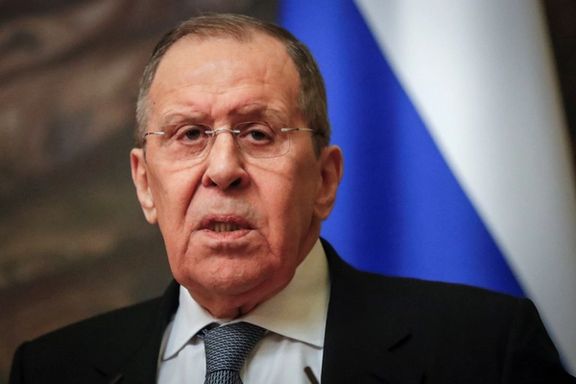
Dzhagaryan told the press conference Wednesday that as an ambassador he was not privy to every piece of information but warned against attempts to divide Moscow and Tehran.
" I can't offer any details as only top officials in Tehran and negotiators in Vienna are aware of them,” he said. “Our interests are important to us but our interests are not to the detriment of others. Don't you think the western [powers] want a division between us? Be aware that our officials, Mr Lavrov and Mr [Hossein] Amir-Abdollahian [Iran’s foreign minister] are in continued contact.”
Equal rights
The Iranian foreign ministry’s spokesman Saeed Khatibzadeh said Monday that Tehran was waiting for “details” having “seen and heard” Lavrov’s comments in the media. The Russian foreign ministry on Monday reported a phone call between Lavrov and Amir-Abdollahian noting agreement that "all participants" in the JCPOA should have "equal rights in relation to the unhindered development of cooperation in all areas without any discrimination.”
The 2015 deal was signed by Iran and the permanent members of the UN Security Council plus Germany (5+1), limiting the Iranian nuclear program, and lifting a raft of United Nations, European Union and US sanctions. The US left the deal in 2018 and imposed ‘maximum pressure’ sanctions designed to end Iranian oil exports and break any links between Iran and the international financial sector.
The remaining signatories – China, France, Germany, Russia, and the United Kingdom – have all argued the US should lift sanctions incompatible with the JCPOA while Tehran should return its nuclear program, expanded since 2019, to JCPOA limits. While promising to revive the JCPOA, President Joe Biden has kept that sanctions in place during the talks.
US Secretary of State Antony Blinken stressed Tuesday that Moscow and Washington – regardless of the Ukraine crisis - shared an interest in reviving the JCPOA. But Victoria Nuland, Undersecretary of State for Political Affairs, told a Senate Foreign Relations Committee hearing on Tuesday that Russia was “trying to up the ante and broaden its demands with regard to the JCPOA.” She insisted: “We are not playing 'Let's Make a Deal.’”
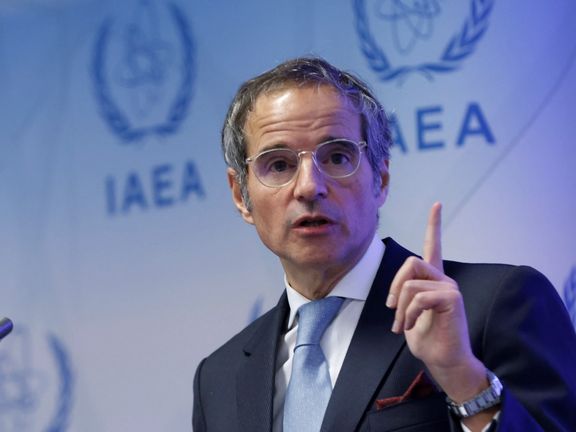
Tensions between the European Union and Russia blew up at the International Atomic Energy Agency board meeting Wednesday as the EU led a walkout.
Stephan Klement, head of the EU delegation to the IAEA, tweeted that the move had been in “response to unacceptable remarks” by Russia. Klement condemned “Russian military aggression” against Ukraine and “resulting nuclear threats to safety of Ukrainian facilities.”
Klement did not tell Twitterati what the Russian had said. Neither did Reuters news agency in its initial report. Russian news media is now generally blocked in the EU.
In his report to the board Monday, IAEA chief Rafael Mariano Grossi highlighted “two major issues high on the international community’s agenda…the safety and security of Ukraine’s nuclear power plants amid the…military conflict, and second, making progress on the clarification of the outstanding safeguards issues” with Iran.
Russia in the 1990s withdrew all nuclear weapons from Ukraine, which had hosted a large part of the Soviet atomic arsenal, but Ukraine has several nuclear facilities, including the decommissioned Chernobyl plant, which is now occupied by Russian forces and has lost electric power, raising fears of a radiation leak.Ukraine’s state-run nuclear company Energoatom said Wednesday fighting between Ukrainian and Russian forces made it impossible to immediately repair the high-voltage power line to the plant.
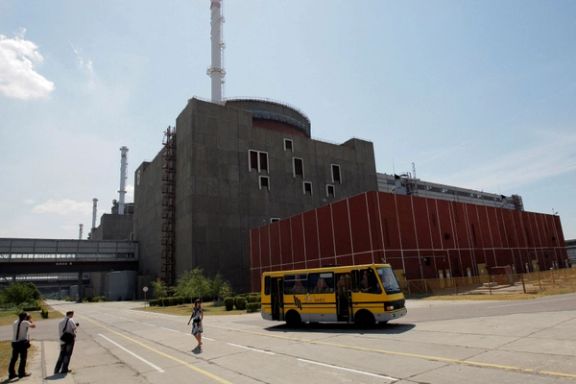
Grossi expressed concern in his report Monday that the Zaporizhzhya nuclear power plant, also now under Russian control, been hit by a shall, causing a fire but no release of radiation.
Ukraine crisis, Iran talks
There has been rampant speculation over links between the Ukraine crisis and the Vienna talksover reviving the 2015 Iran nuclear agreement since Saturday when Russian foreign minister Sergei Lavrov said Moscow wanted assurances that Ukraine sanctions would not impact its economic and other ties with Iran, including its role in implementing the JCPOA, if a new agreement is reached.
Lavrov said that an “avalanche of aggressive sanctions that have erupted from the West − and which I understand has not yet stopped” meant Moscow needed a “guarantee that these sanctions will not in any way touch the regime of trade-economic and investment relations which is laid down in the Joint Comprehensive Plan of Action."
Playing down Lavrov’s concerns, the United States Secretary of State Antony Blinken Tuesday noted that Russia was “still engaged” in efforts to revive the JCPOA and stressed Washington’s and Moscow’s shared intertest in restricting Iran’s nuclear program.
In Vienna Wednesday, the US Deputy Chief of Mission to the IAEA Louis Bono told the board that Iran needed to answer agency questions over its nuclear work before 2003 as “a legal obligation separate from its JCPOA commitments.” Bono said that “significant concerns” over Iran’s responsibility for transparency under the Nuclear Non-Proliferation ‘safeguards’ rules “remain unresolved after more than two years because of Iran’s lack of substantive engagement.”
Bono welcomed the March 5 statement by Grossi and Mohammad Eslami, head of the Atomic Energy Organization of Iran, setting out a timetable by which Tehran would satisfy the agency over its queries by June 20. Bono cited Grossi in saying, “the only way these issues go away is if they are clarified to the full satisfaction of the IAEA.”
But he added, “We remain deeply concerned by the Director General’s reports that since February 2021 Iran has stopped implementing its Additional Protocol. This significantly impacts the ability of the Agency to provide credible assurance of the absence of undeclared nuclear material and activities in Iran.”